 W
WThe African Charter on Human and Peoples' Rights is an international human rights instrument that is intended to promote and protect human rights and basic freedoms in the African continent.
 W
WThe African Court on Human and Peoples' Rights, also known simply as the African Court, is an international court established by member states of the African Union (AU) to implement provisions of the African Charter on Human and Peoples' Rights. Seated in Arusha, Tanzania, it is considered the judicial arm of the AU, and is one of only three regional human rights courts.
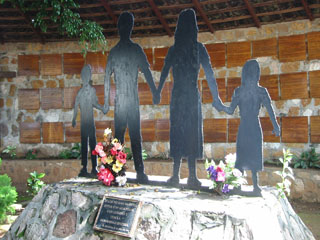 W
WThe American Convention on Human Rights, also known as the Pact of San José, is an international human rights instrument. It was adopted by many countries in the Western Hemisphere in San José, Costa Rica, on 22 November 1969. It came into force after the eleventh instrument of ratification was deposited on 18 July 1978.
 W
WThe Biological Weapons Convention (BWC), or Biological and Toxin Weapons Convention (BTWC), is a disarmament treaty that effectively bans biological and toxin weapons by prohibiting their development, production, acquisition, transfer, stockpiling and use. The treaty's full name is the Convention on the Prohibition of the Development, Production and Stockpiling of Bacteriological (Biological) and Toxin Weapons and on their Destruction.
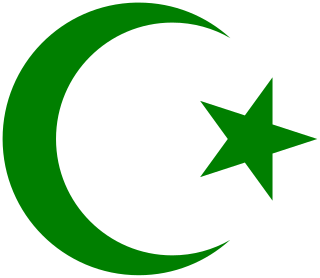 W
WThe Cairo Declaration on Human Rights in Islam (CDHRI) is a declaration of the member states of the Organisation of Islamic Cooperation (OIC) adopted in Cairo, Egypt, on 5 August 1990, which provides an overview on the Islamic perspective on human rights, and affirms Islamic sharia as its sole source. CDHRI declares its purpose to be "general guidance for Member States [of the OIC] in the field of human rights".
 W
WThe Charter of Fundamental Rights of the European Union (CFR) enshrines certain political, social, and economic rights for European Union (EU) citizens and residents into EU law. It was drafted by the European Convention and solemnly proclaimed on 7 December 2000 by the European Parliament, the Council of Ministers and the European Commission. However, its then legal status was uncertain and it did not have full legal effect until the entry into force of the Treaty of Lisbon on 1 December 2009.
 W
WThe Chemical Weapons Convention (CWC), officially the Convention on the Prohibition of the Development, Production, Stockpiling and Use of Chemical Weapons and on their Destruction, is an arms control treaty administered by the Organisation for the Prohibition of Chemical Weapons (OPCW), an intergovernmental organization based in The Hague, The Netherlands. The treaty entered into force on 29 April 1997, and prohibits the large-scale use, development, production, stockpiling and transfer of chemical weapons and their precursors, except for very limited purposes. The main obligation of member states under the convention is to effect this prohibition, as well as the destruction of all current chemical weapons. All destruction activities must take place under OPCW verification.
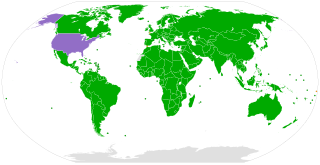 W
WThe United Nations Convention on the Rights of the Child is an international human rights treaty which sets out the civil, political, economic, social, health and cultural rights of children. The Convention defines a child as any human being under the age of eighteen, unless the age of majority is attained earlier under national legislation.
 W
WThe International Covenant on Civil and Political Rights (ICCPR) is a multilateral treaty adopted by United Nations General Assembly Resolution 2200A (XXI) on 16 December 1966, and in force from 23 March 1976 in accordance with Article 49 of the covenant. Article 49 allowed that the covenant would enter into force three months after the date of the deposit of the thirty-fifth instrument of ratification or accession. The covenant commits its parties to respect the civil and political rights of individuals, including the right to life, freedom of religion, freedom of speech, freedom of assembly, electoral rights and rights to due process and a fair trial. As of September 2019, the Covenant has 173 parties and six more signatories without ratification. Notable holdouts are People's Republic of China and Cuba. North Korea tried to withdraw.
 W
WThe First Optional Protocol to the International Covenant on Civil and Political Rights is an international treaty establishing an individual complaint mechanism for the International Covenant on Civil and Political Rights (ICCPR). It was adopted by the UN General Assembly on 16 December 1966, and entered into force on 23 March 1976. As of May 2020, it had 35 signatories and 116 states parties. Two of the ratifying states—Jamaica and Trinidad and Tobago—have denounced the protocol.
 W
WThe Committee Against Torture (CAT) is a body of human rights experts that monitors implementation of the United Nations Convention against Torture by state parties. The Committee is one of eight UN-linked human rights treaty bodies. All state parties are obliged under the Convention to submit regular reports to the CAT on how rights are being implemented. Upon ratifying the Convention, states must submit a report within one year, after which they are obliged to report every four years. The Committee examines each report and addresses its concerns and recommendations to the state party in the form of "concluding observations." Under certain circumstances, the CAT may consider complaints or communications from individuals claiming that their rights under the Convention have been violated.
 W
WThe Convention on the issue of multilingual extracts from civil status records is a multilateral convention, drafted by the International Commission on Civil Status which defines a uniform format for extracts on civil status. The convention was signed in Vienna 8 September 1976 by 12 European states, and entered into force 30 July 1983 upon the ratification of the 5th state. As 17 October 2015, the convention is in force in 23 European countries and Cape Verde; the convention is open for accession to any state.
 W
WThe Declaration by United Nations was the main treaty that formalized the Allies of World War II and was signed by 47 national governments between 1942 and 1945. On New Year's Day 1942, during the Arcadia Conference, the Allied "Big Four" signed a short document which later came to be known as the United Nations Declaration, and the next day the representatives of 22 other nations added their signatures.
 W
WThe Declaration of Montreal on Lesbian, Gay, Bisexual, and Transgender Human Rights is a document adopted in Montreal, Quebec, Canada, on July 29, 2006, by the International Conference on LGBT Human Rights which formed part of the first World Outgames. The Declaration outlines a number of rights and freedoms pertaining to LGBT and intersex people that it is proposed be universally guaranteed. It encompasses all aspects of human rights, from the guarantee of fundamental freedoms to the prevention of discrimination against LGBT people in healthcare, education and immigration. The Declaration also addresses various issues that impinge on the global promotion of LGBT rights and intersex human rights. Intended as a starting point in listing the demands of the international LGBT movement, it will ultimately be submitted to the United Nations.
 W
WThe Declaration of the Rights of Man and of the Citizen, set by France's National Constituent Assembly in 1789, is a human civil rights document from the French Revolution. Inspired by Enlightenment philosophers, the Declaration was a core statement of the values of the French Revolution and had a major impact on the development of popular conceptions of individual liberty and democracy in Europe and worldwide.
 W
WThe Declaration of the Rights of the Man and of the Citizen of 1793 is a French political document that preceded that country's first republican constitution. The Declaration and Constitution were ratified by popular vote in July 1793, and officially adopted on 10 August; however, they never went into effect, and the constitution was officially suspended on 10 October. It is unclear whether this suspension was thought to affect the Declaration as well. The Declaration was written by the commission that included Louis Antoine Léon de Saint-Just and Marie-Jean Hérault de Séchelles during the period of the French Revolution. The main distinction between the Declaration of 1793 and the Declaration of the Rights of Man and of the Citizen of 1789 is its egalitarian tendency: equality is the prevailing right in this declaration. The 1793 version included new rights, and revisions to prior ones: to work, to public assistance, to education, and to resist oppression.
 W
WThe Equal Treatment in Goods and Services Directive 2004 of 13 December 2004 is a directive which prohibits both direct and indirect sexual discrimination in the provision of goods and services in the European Union.
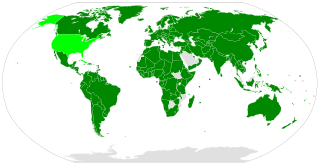 W
WThe International Covenant on Economic, Social and Cultural Rights (ICESCR) is a multilateral treaty adopted by the United Nations General Assembly on 16 December 1966 through GA. Resolution 2200A (XXI), and came in force from 3 January 1976. It commits its parties to work toward the granting of economic, social, and cultural rights (ESCR) to the Non-Self-Governing and Trust Territories and individuals, including labour rights and the right to health, the right to education, and the right to an adequate standard of living. As of July 2020, the Covenant has 171 parties. A further four countries, including the United States, have signed but not ratified the Covenant.
 W
WThe Optional Protocol to the International Covenant on Economic, Social and Cultural Rights is an international treaty establishing complaint and inquiry mechanisms for the International Covenant on Economic, Social and Cultural Rights. It was adopted by the UN General Assembly on 10 December 2008, and opened for signature on 24 September 2009. As of October 2018, the Protocol has 45 signatories and 24 state parties. It entered into force on 5 May 2013.
 W
WThe Emancipation Proclamation, or Proclamation 95, was a presidential proclamation and executive order issued by United States President Abraham Lincoln on September 22, 1862, during the Civil War. The Proclamation read:That on the first day of January in the year of our Lord, one thousand eight hundred and sixty-three, all persons held as slaves within any State, or designated part of a State, the people whereof shall then be in rebellion against the United States shall be then, thenceforward, and forever free; and the executive government of the United States, including the military and naval authority thereof, will recognize and maintain the freedom of such persons, and will do no act or acts to repress such persons, or any of them, in any efforts they may make for their actual freedom.
 W
WThe International Convention for the Protection of All Persons from Enforced Disappearance (ICPPED) is an international human rights instrument of the United Nations and intended to prevent forced disappearance defined in international law, crimes against humanity. The text was adopted by the United Nations General Assembly on 20 December 2006 and opened for signature on 6 February 2007. It entered into force on 23 December 2010. As of October 2019, 98 states have signed the convention and 62 have ratified it.
 W
WThe European Convention on Human Rights is an international convention to protect human rights and political freedoms in Europe. Drafted in 1950 by the then newly formed Council of Europe, the convention entered into force on 3 September 1953. All Council of Europe member states are party to the Convention and new members are expected to ratify the convention at the earliest opportunity.
 W
WThe European Social Charter is a Council of Europe treaty which was opened for signature on October 18, 1961 and initially became effective on February 26, 1965, after West Germany had become the fifth of the 13 signing nations to ratify it. By 1991, 20 nations had ratified it.
 W
WFundamental Rights in the Federal Republic of Germany are a set of rights guaranteed to everyone in Germany and partially to German people only through their Federal Constitution, the Grundgesetz and the constitutions of some of the States of Germany. In the Federal Constitution, the majority of the Grundrechte are contained in the first title, Articles 1 to 19 of the Grundgesetz (GG). These rights have constitutional status, binding each of the country's constitutional institutions. In the event that these rights are violated and a remedy is denied by other courts, the constitution provides for an appeal to the Federal Constitutional Court (Bundesverfassungsgericht).
 W
WHuman Rights and Climate Change is a conceptual and legal framework under which international human rights and their relationship to global warming are studied, analyzed, and addressed. The framework has been employed by governments, United Nations organizations, intergovernmental and non-governmental organizations, human rights and environmental advocates, and academics to guide national and international policy on climate change under the United Nations Framework Convention on Climate Change (UNFCCC) and the core international human rights instruments.
 W
WThe Inter-American Convention to Prevent and Punish Torture (IACPPT) is an international human rights instrument, created in 1985 within the Western Hemisphere Organization of American States and intended to prevent torture and other similar activities.
 W
WThe Leiden Draft is the translation used in Anglophone historiography of the Dutch-language concept Leids Ontwerp, a draft-manifesto discussed by the Holland congress of representatives of exercitiegenootschappen on 8 October 1785 in Leiden in the context of the so-called Patriot revolution of 1785 in the Dutch Republic. This draft resulted in publication of the manifesto entitled Ontwerp om de Republiek door eene heilzaame Vereeniging van Belangen van Regent en Burger van Binnen Gelukkig en van Buiten Gedugt te maaken, Leiden, aangenomen bij besluit van de Provinciale Vergadering van de Gewapende Corpsen in Holland, op 4 oktober 1785 te Leiden. It contained an exposition of the Patriot ideology and arrived at the formulation of twenty proposals of political reform in a democratic vein.
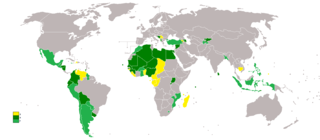 W
WThe International Convention on the Protection of the Rights of All Migrant Workers and Members of Their Families is a United Nations multilateral treaty governing the protection of migrant workers and families. Signed on 18 December 1990, it entered into force on 1 July 2003 after the threshold of 20 ratifying States was reached in March 2003. The Committee on Migrant Workers (CMW) monitors implementation of the convention, and is one of the seven UN-linked human rights treaty bodies. The convention applies as of August 2021 in 56 countries.
 W
WThe New Laws, also known as the New Laws of the Indies for the Good Treatment and Preservation of the Indians, were issued on November 20, 1542, by Charles V, Holy Roman Emperor and regard the Spanish colonization of the Americas. Following complaints and calls for reform from individuals such as the Dominican friar Bartolomé de Las Casas, these laws were intended to prevent the exploitation and mistreatment of the indigenous peoples of the Americas by the encomenderos, by strictly limiting their power and dominion over groups of natives. The text of the New Laws has been translated into English.
 W
WA Parlimentaire is defined by the U.S. Department of Defense as "an agent employed by a commander of belligerent forces in the field to go in person within the enemy lines for the purpose of communicating or negotiating openly and directly with the enemy commander".
 W
WThe Prague Declaration on European Conscience and Communism was a declaration which was initiated by the Czech government and signed on 3 June 2008 by prominent European politicians, former political prisoners and historians, among them former Czech President Václav Havel and future German President Joachim Gauck, calling for "Europe-wide condemnation of, and education about, the crimes of communism." Much of the content of the declaration reproduced demands formulated by the European People's Party in 2004, and draws heavily on totalitarianism theory.
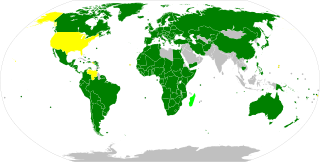 W
WThe Convention Relating to the Status of Refugees, also known as the 1951 Refugee Convention or the Geneva Convention of 28 July 1951, is a United Nations multilateral treaty that defines who a refugee is, and sets out the rights of individuals who are granted asylum and the responsibilities of nations that grant asylum. The Convention also sets out which people do not qualify as refugees, such as war criminals. The Convention also provides for some visa-free travel for holders of refugee travel documents issued under the convention.
 W
WThe Protocol Relating to the Status of Refugees is a key treaty in international refugee law. It entered into force on 4 October 1967, and 146 countries are parties.
 W
WThe Rome Statute of the International Criminal Court is the treaty that established the International Criminal Court (ICC). It was adopted at a diplomatic conference in Rome, Italy on 17 July 1998 and it entered into force on 1 July 2002. As of November 2019, 123 states are party to the statute. Among other things, the statute establishes the court's functions, jurisdiction and structure.
 W
WThe Convention Relating to the Status of Stateless Persons is a 1954 United Nations multilateral treaty that aims to protect stateless individuals.
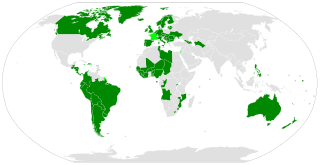 W
WThe Convention on the Reduction of Statelessness is a 1961 United Nations multilateral treaty whereby sovereign states agree to reduce the incidence of statelessness. The Convention was originally intended as a Protocol to the Convention Relating to the Status of Refugees, while the 1954 Convention Relating to the Status of Stateless Persons was adopted to cover stateless persons who are not refugees and therefore not within the scope of the Convention Relating to the Status of Refugees.
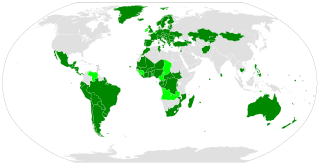 W
WThe Optional Protocol to the Convention against Torture and other Cruel, Inhuman or Degrading Treatment or Punishment is a treaty that supplements to the 1984 United Nations Convention Against Torture. It establishes an international inspection system for places of detention modeled on the system that has existed in Europe since 1987.
 W
WThe Convention against Torture and Other Cruel, Inhuman or Degrading Treatment or Punishment is an international human rights treaty, under the review of the United Nations, that aims to prevent torture and other acts of cruel, inhuman, or degrading treatment or punishment around the world.
 W
WThe Universal Declaration of Human Rights (UDHR) is an international document adopted by the United Nations General Assembly that enshrines the rights and freedoms of all human beings. It was accepted by the General Assembly as Resolution 217 during its third session on 10 December 1948 at the Palais de Chaillot in Paris, France. Of the 58 members of the United Nations at the time, 48 voted in favour, none against, eight abstained, and two did not vote.
 W
WThe Yogyakarta Principles is a document about human rights in the areas of sexual orientation and gender identity, published as the outcome of an international meeting of human rights groups in Yogyakarta, Indonesia, in November 2006. The Principles were supplemented in 2017, expanding to include new grounds of gender expression and sex characteristics, and a number of new principles.